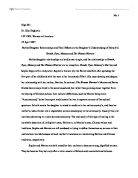Mother/Daughter Relationships and Their Effects on the Daughter(TM)s Understanding of Herself in Breath, Eyes, Memory and The Woman Warrior
Mir
Olga Mir
Dr. Sika Dagbovie
LIT 4383: Women in Literature
25 April 2007
Mother/Daughter Relationships and Their Effects on the Daughter’s Understanding of Herself in Breath, Eyes, Memory and The Woman Warrior
Mother/daughter relationships are hardly ever simple, and the relationships in Breath, Eyes, Memory and The Woman Warrior are no exception. Breath, Eyes, Memory’s Martine and Sophie begin with a rocky start. Sophie is thrown into the Bronx head first after spending the first part of her childhood with her aunt in her homeland of Haiti. She must develop and deepen her relationship with her mother, Martine. In contrast, The Woman Warrior’s Maxine and Brave Orchid have always lived in the same household, but rather than growing closer together from the sharing of Chinese culture, their cultural differences, such as Maxine being more “Americanized,” drive them apart and alienate the two in separate corners of the cultural spectrum. In both novels the daughter is raised to conform to her native country’s, and thus her mother’s, idea of what role a respectable woman should play in the community. Usually this role involves submitting to a male-dominated society. The end result of this type of rearing is the inevitable desertion of, in Sophie’s case, Haitian or, in Maxine’s case, Chinese values and traditions. Sophie and Maxine are left confused in trying to define themselves as women in their multicultural worlds because of each mother’s insistence on maintaining Haitian and Chinese traditions, respectively.
Sophie and Maxine are both raised by their mothers to become strong, dignified women. They do become this, but only after a roller coaster of fallouts and reconciliations between Sophie and Martine in Breathe, Eyes, Memory and Maxine and Brave Orchid in The Woman Warrior. The two girls’ childhoods are seemingly altogether unalike and unrelated. Sophie, in a sense, has two mothers. Tante Atie cares for her until the age of 12, when Sophie is flown to New York to live with her biological mother and Atie’s sister, Martine. Sophie even makes Tante Atie a Mother’s Day card, insisting that the card is rightfully hers rather than Martine’s. Atie, however, dismisses this notion: “‘It is your card,’ I [Sophie] insisted. ‘It is for a mother, your mother.’ She [Atie] motioned me away with a wave of her hand. ‘When it is Aunt’s Day, you can make me one” (9). When Sophie is flown to the U.S., it is as though she is being torn away from her real mother rather than flying to be with her. This in itself makes the growth of Martine and Sophie’s mother/daughter relationship more difficult because Sophie must adjust to her “new” mother. In contrast, Maxine has always lived with Brave Orchid. This, however, does not mean their relationship is any closer than that of Sophie and Martine. Emanating the stereotype, Blue Orchid resents the fact that Maxine is a girl. She reinforces the negative standards that Chinese women are useless and a disappointment. This deeply hurts Maxine, so much that “when one of my [Maxine’s] parents or the emigrant villagers said ‘“Feeding girls is feeding cowbirds,”’ I would trash on the floor and scream so hard I couldn’t talk” (46). Growing up in an environment that completely degrades the female population surely can not be a positive aspect of Maxine’s relationship with her mother. Brave Orchid is never appreciative of the straight A’s Maxine receives in school; straight A’s do not put food on the table. As a child the author recalls that her mother’s enthusiasm for her was duller than that for the slave girl her mother had cherished back in China. Brave Orchid makes Maxine feels shame in not having any “true” skills and costing her money rather than earning it for her. Thus, whereas Sophie is never given the chance to experience her mother’s affection, and faults, until the age of 12, Maxine has always had to live with her own mother’s demeaning manner.







